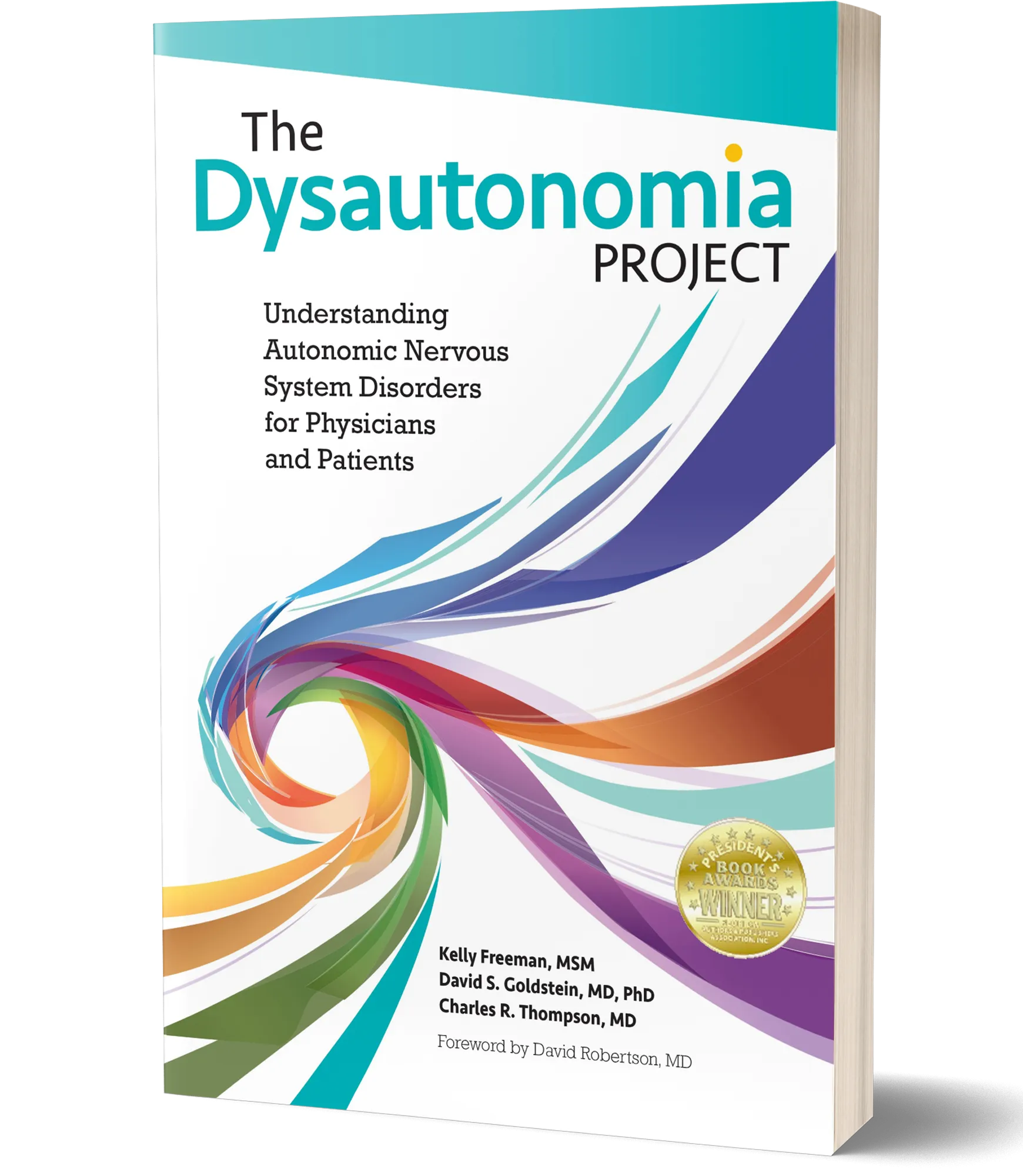Home » Dysautonomias » Type 2 Diabetes and Autonomic Disorders with Alex Barboi, MD, FACP
Type 2 Diabetes and Autonomic Disorders with Alex Barboi, MD, FACP
In this video Dr. Barboi discusses the relationship between Type 2 diabetes and autonomic disorders with an emphasis on autonomic neuropathy which is commonly seen but not well recognized in diabetic patients.
Mr. Al Ruechel: Hi everybody, I’m Al Ruechel. We continue our discussions here on our website, talking about dysautonomias and they are affected by other conditions, and we’re going to be talking about diabetes and dysautonomia. Joining me right now is Dr. Alex Barboi. Thank you for stopping by, we really appreciate it.
Dr. Alex Barboi: I appreciate it too.
Mr. Ruechel: So, let’s start up by giving me a little bit of your background and how you are you involved, working with dysautonomias.
Dr. Barboi: So, I’m an internist and neurologist. I take care of patients with autonomic disorders typically as a neurologist predominantly, so I meet them for a diagnosis of diabetic neuropathy or diabetic autonomic neuropathy and try to engage in their care.
Mr. Ruechel: How long have you been doing this?
Dr. Barboi: It’s been 15 years.
Mr. Ruechel: And you’re seeing more patients now than ever before?
Dr. Barboi: I am because of my subspecialty interest, yes.
Mr. Ruechel: Yeah, so let’s start off, because I want to talk about the interaction between diabetes and dysautonomias, particularly any autonomic disorder. So, let’s just step back for understanding purposes, what is diabetes and what is it caused by?
Dr. Barboi: There are a few ways that one can get diabetes. One possibility is that there is a genetic underpinning, so there are genetic determinants of diabetes or family history of diabetes. The other way to get diabetes is lifestyle so what we eat, when we eat, and how much of it, does play a role here; and I think that is probably the second biggest cause. There is no good one cause for diabetes yet, but there are some genetic syndromes where usually the disease manifests itself much more frequently in family members.
Mr. Ruechel: You can live with it, correct?
Dr. Barboi: Yes, it’s manageable. It takes a lot of lifestyle changes. It’s not easy but it’s doable.
Mr. Ruechel: Now, autonomic disorders, how do those interact with each other? Is it a chicken or the egg which comes first or what is the relationship in general?
Dr. Barboi: There are 86 million that live with pre-diabetes, so it’s a condition that comes before diabetes where we think they may develop it. So, it’s a very common disorder. We think that what comes first is diabetes. Unfortunately, some of the complications in diabetes is poorly managed or not managed properly is nerve dysfunction or what we call neuropathy and that neuropathy is sometimes affecting the autonomic nerves.
Mr. Ruechel: So, what is the role then normally in the autonomic nervous system with diabetes? What would the body be telling itself in terms of managing this?
Dr. Barboi: Imagine that there are little nerves that connect our brain and spinal cords to all our internal organs and then some of those nerves don’t work properly. So for instance, the brain would like to control our heart rate, like mine is high now because I am here with you, but perhaps if I had a diabetic neuropathy or diabetic autonomic neuropathy, then the connection between my brain and my heart wouldn’t be that well established, so my heart would be either higher than it’s supposed to be or too low, say it would not be tuned up properly.
Mr. Ruechel: When you do clinical evaluations, how does that help you make a determination whether the autonomic nervous system is involved?
Dr. Barboi: So, it takes a little bit of thinking ahead of time. So first there has to be a diagnosis of diabetes. Typically if somebody has had diabetes for a little bit longer, so more than 5 years usually, particularly if the diabetes has been poorly controlled, if there are other complications, for instance involvement of the retinal blood vessel, called retinopathy, diabetic neuropathy, numbness and pain in the feet, and problems with blood flow in the feet as so forth. That’s when we would be thinking that perhaps it is possible that somebody may have a diabetic autonomic neuropathy and the symptoms there are not easy to pick up, so it affects multiple organs, so it’s difficult. So, somebody may have excess dizziness or fainting, somebody may have troubles with emptying their bladder, they may have excessive diarrhea or constipation, trouble sweating maybe too much or not enough, overheating sometimes. It takes a little bit of detective work, so it takes a little bit of thinking outside of the box a little bit and trying to think about it, way before you get the diagnosis. We think about 60% of people that have type 2 diabetes may have diabetic autonomic neuropathy that is not diagnosed.
Mr. Ruechel: Oh gosh, that’s high. So, because you are so specialized, if physicians are watching this right now, physicians that deal with diabetes, what tools are they going to use to determine if it is in fact attached to the autonomic system?
Dr. Barboi: So, what we would have to do here is to try to think of them as a probability. So, if you have what I told you and diabetes has been there for a while, there are other complications of diabetes. It’s very important to think of the possibility of a diabetic autonomic neuropathy and clues typically come with inappropriate blood pressure and heart rates, abnormal pupillary responses when we check the pupil with a light, and multiple symptoms. The symptoms in multiple organs that the patient would bring to us and that’s how we would have to think about it then and try to come up with a way to test for it and figure it out.
Mr. Ruechel: So, how hard is it to think outside the box?
Dr. Barboi: Very hard for all of us, because we all get sort of bunched in.
Mr. Ruechel: Right in the middle.
Mr. Ruechel: Where are we going in the future in terms of other doctors using these kind of procedures and in terms of, because obviously with so many people that have pre-diabetes, I mean all the commercials are all over the place, trying to warn people what to do, and yet we have this underlying condition of autonomic disorders that may have just as many people involved with that, that we don’t know about.
Dr. Barboi: True. We through our testing for this disorder can tell if the problem is a diabetic autonomic neuropathy or not. It is really important to determine that. The way that we would prevent this from happening is early in the treatment of diabetes, very strict control of blood sugar, body weight, and diet are going to be tremendously helpful for long periods of time, 30 to 40 years out.
Mr. Ruechel: Oh gosh!
Dr. Barboi: Importantly though, if the diabetic autonomic neuropathy is present, the way that we tell people to manage their blood sugars and how to do this, changes a little bit. What’s important is that once somebody has diabetic autonomic neuropathy, their heart is involved. If that’s the case, there’s a higher risk for mortality and so we absolutely have to figure that out very early so that we can manage that properly.
Mr. Ruechel: One of the things that we are trying to do with this video is for general practitioners, nurses, and other health professionals to kind of know what signs can you give them that they might be able to think out of the box that it might be more than just diabetes.
Dr. Barboi: So I’d come in and say, I have persistently dry eyes and mouth, I have palpitations, and the doctor would find the heart rate in the office that is too high just sitting down, I explain nausea, difficulty eating, trouble with diarrhea or constipation, if I’m man, I would have erectile dysfunction, if I was a woman, I would have excess dryness, I would have difficulty emptying urinary bladder…
Mr. Ruechel: Each one of these are individual symptoms, can they happen all at once. Because I am thinking…
Dr. Barboi: They don’t.
Mr. Ruechel: They don’t. See, that’s got to be the tricky part because some of those things that you mentioned… I have horrible dry mouth which is why I have gum in my mouth right now, but then somebody makes the leap and go, well it could be an autonomic disorder. So, how many of these conditions, on your little checklist you go through before you say, well now let us look at autonomics?
Dr. Barboi: I think the context would be the patient, the right setting, and the duration of the diabetes, but I think usually if you have more than two organ systems involved, so if I come and say I have dry eyes and dry mouth, I also have unexplained diarrhea or you know, I have dry eyes and mouth and I have, you know, erectile dysfunction. So that would flag it for us.
Mr. Ruechel: Last two things we are going to do, talk to doctors out there, what do they need to know specifically. Is there one important message that you would like to deliver to them.
Dr. Barboi: Yes, so I think that the message here is that early diagnosis and treatment of a diabetic autonomic neuropathy, particularly if there’s cardiac involvement, is very important because it has implications into early morbidity, silent myocardial ischemic, and sudden cardiac death. So, it’s very important to figure it out early and manage it.
Mr. Ruechel: Dr. Barboi, thank you so much. I appreciate it.
Dr. Barboi: I appreciate it. Thank you.

Wolfgang Singer, MD
Associate Professor of Neurology
Mayo Clinic Rochester, MN




























